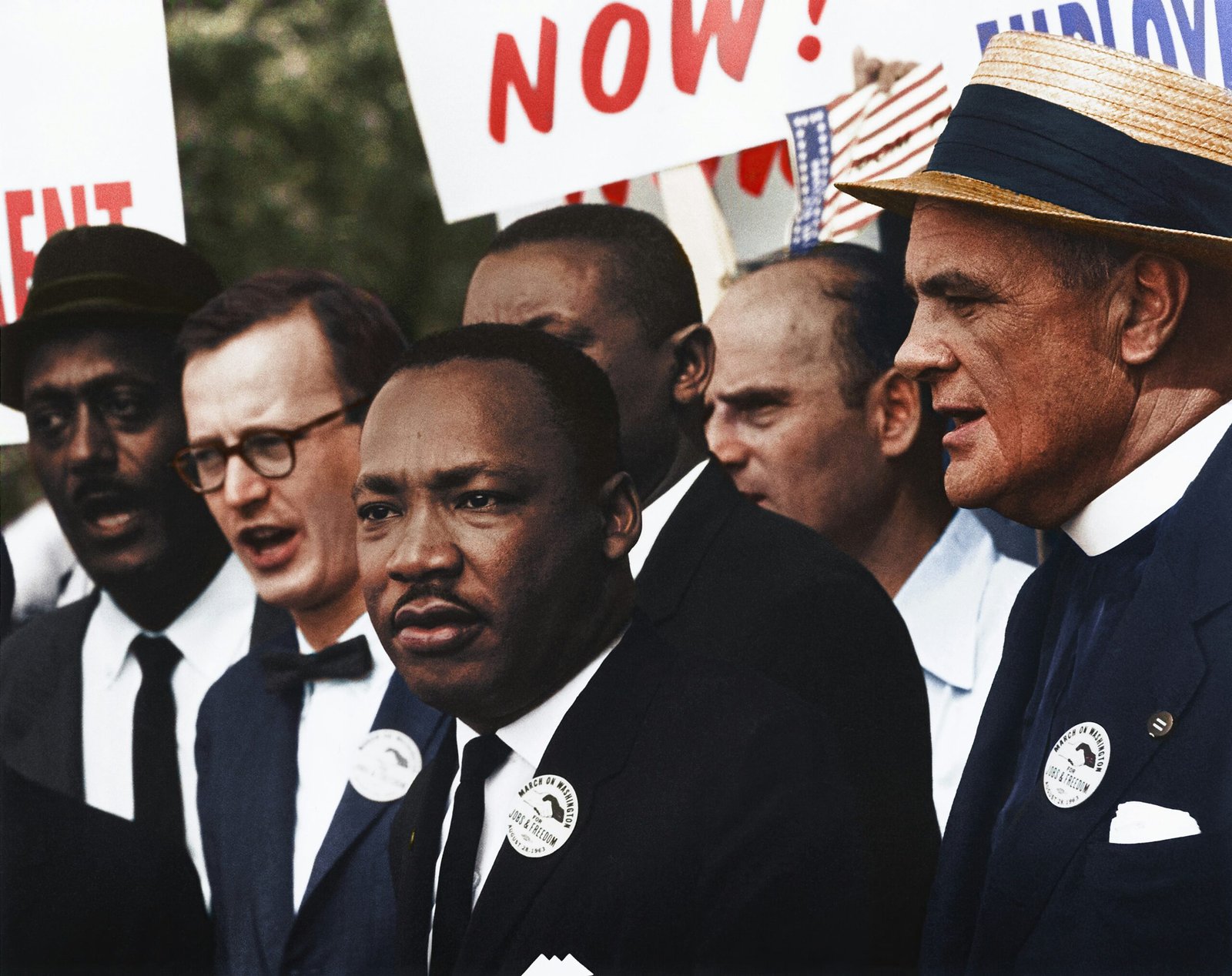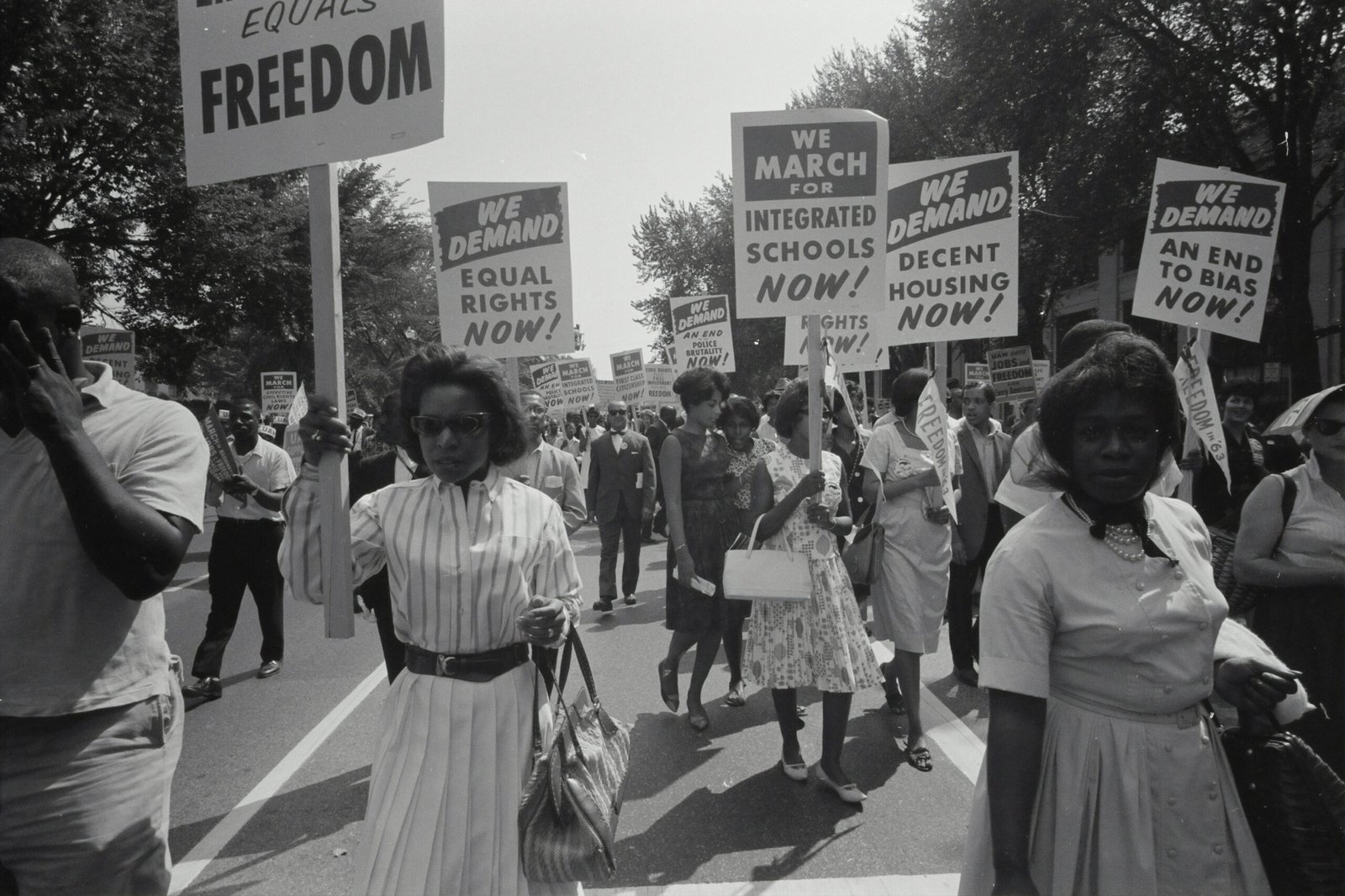Introduction: The Importance of Understanding Black History
Black history in America serves as a critical lens through which we can examine the cultural, social, and political fabric of the nation. Understanding this history is not solely an academic pursuit; rather, it is paramount for fostering communal harmony and reconciliatory dialogues in a diverse society. The impact of historical events such as slavery, segregation, and the civil rights movement resonates profoundly within contemporary conversations about race and equality, shaping the experiences of both Black and white Americans. A comprehensive grasp of Black history is essential for understanding the systemic issues that continue to affect marginalized communities today.
Black history contributes to the broader narrative of American identity, highlighting the struggles and achievements of Black individuals and communities. From the contributions of figures like Frederick Douglass and Harriet Tubman to the cultural significance of the Harlem Renaissance and the ongoing fight for civil rights, the significance of these historical moments cannot be overstated. For white Americans, acknowledging and understanding the nuances of Black history can lead to greater awareness of privilege and systemic inequality, ultimately paving the way for a more equitable society.
Moreover, understanding Black history is not merely about recognizing past injustices; it involves appreciating the ongoing resilience and contributions of Black Americans. It encourages individuals to engage with the past critically, facilitating conversations that challenge stereotypes and foster empathic understanding. As America continues to grapple with issues of race and equality in the 21st century, a well-rounded comprehension of Black history becomes ever more crucial. It creates an informed citizenry prepared to confront the complexities of our shared narrative, ultimately enhancing social cohesion and reducing racial tensions.
Historical Overview of Black History in America
Black history in America is marked by a series of significant events that have shaped the nation’s socio-political landscape. The timeline begins with the arrival of enslaved Africans in the early 17th century, as they were forcibly brought to work on plantations, primarily in the Southern states. This brutal system of slavery persisted for nearly 250 years, characterized by dehumanization, violence, and systemic oppression.
The abolition of slavery in 1865, following the Civil War, marked a pivotal transition. The Thirteenth Amendment legally emancipated African Americans, yet their struggles for equality were far from over. During the Reconstruction Era, from 1865 to 1877, efforts were made to integrate freed slaves into society and grant them civil rights, including the Fourteenth and Fifteenth Amendments. However, the subsequent rise of Jim Crow laws established a regime of racial segregation that persisted for decades.
The early 20th century saw the emergence of influential figures such as W.E.B. Du Bois and Booker T. Washington, who contributed significantly to the discourse on civil rights and empowerment for African Americans. The Harlem Renaissance of the 1920s catalyzed a cultural movement that celebrated Black identity, producing notable artists, writers, and musicians.
The civil rights movement of the 1950s and 1960s marked a turning point, leading to significant milestones including the landmark Brown v. Board of Education Supreme Court decision in 1954, and the Civil Rights Act of 1964. Leaders like Martin Luther King Jr., Malcolm X, and Rosa Parks became symbols of the relentless struggle for justice and equality. These events are critical in providing insight into the contemporary issues that African Americans continue to face.
Understanding this historical context is essential for evaluating the depth of white Americans’ knowledge regarding Black history and its ongoing implications in today’s society. By comprehensively examining these pivotal moments, one can begin to appreciate the complexities of racial dynamics in the United States.
Common Misconceptions About Black History
Misconceptions about Black history in America often stem from a combination of oversimplified narratives and societal stereotypes that dominate mainstream discourse. One prevalent myth is the notion that Black history essentially began with slavery. This oversimplification not only ignores the rich and diverse cultures that existed before European colonization but also erases significant contributions made by Black individuals and communities throughout American history. From the early presence of Africans in America to the influential roles they played in shaping the nation, reducing their history to a singular narrative can prevent a comprehensive understanding.
Another common misconception involves the perception of Black Americans solely as victims. While it is undeniable that systemic racism and oppression have profoundly affected the lives of Black individuals, this viewpoint overlooks the resilience, agency, and achievements of Black people throughout history. Celebrating figures such as Frederick Douglass, Harriet Tubman, and more contemporary leaders highlights the complexity of Black experiences and counters the simplified victim narrative. By applying a more nuanced perspective, one recognizes that Black history is not merely defined by struggle, but also by perseverance and triumph.
Additionally, stereotypes surrounding Black culture often hinder genuine understanding. These stereotypes perpetuate narrow views that can distort perceptions of Black Americans in both historical and contemporary contexts. Relying on these oversimplified images contributes to the erasure of critical historical events, such as the Harlem Renaissance or the Civil Rights Movement, which are fundamental to comprehending the breadth of Black experiences in America. Understanding the intricate dynamics of Black history is crucial for counteracting these misconceptions. This knowledge not only enhances appreciation but is also essential for fostering more meaningful dialogues about race and history.
Educational Disparities: Teaching Black History in Schools
The teaching of Black history in American schools has been a complex and often contentious issue. Curricula across the nation vary widely, influencing the depth and accuracy of Black historical narratives presented to students, particularly those who identify as white. Many states have adopted frameworks that inadequately represent the contributions, struggles, and experiences of Black Americans, leading to a significant gap in understanding among students.
Textbooks used in classrooms frequently downplay or oversimplify crucial events and figures in Black history. For example, subjects like slavery, the Civil Rights Movement, and contemporary issues surrounding racial injustice may be reduced to minimal coverage or framed in ways that detract from their significance. Consequently, this limited exposure can create misunderstandings or reinforce existing biases among white students who may lack comprehensive education on the subject.
Moreover, teaching approaches can vary, with some states emphasizing a Eurocentric narrative to history that often neglects the extensive contributions of Black individuals. Often, this results in a historical portrayal that omits essential contexts and perspectives, subsequently affecting students’ ability to appreciate the multifaceted nature of American history. These educational disparities not only shape the understanding of Black history among white students but can also perpetuate systemic ignorance and racial tension.
Misinformation and a lack of robust teaching materials highlight the need for educational reforms aimed at inclusivity and accuracy. Comprehensive training for educators is crucial to ensure they are equipped to deliver an inclusive history curriculum. By elevating the narratives of Black Americans within educational frameworks, students are better positioned to understand the richness of their country’s past. Such measures could foster a more informed and empathetic society, where racial understanding is bolstered through education.
The Role of Media in Shaping Perceptions of Black History
The media plays a pivotal role in shaping public perceptions and understandings of history, particularly concerning Black history in America. Through various platforms, including films, documentaries, television shows, and news outlets, media representations significantly influence how Black experiences and narratives are understood by broader audiences, including white individuals. The portrayal of Black history in media can either illuminate the struggles and achievements of Black communities or alternatively perpetuate long-standing stereotypes that simplify or distort reality.
Films and documentaries often serve as powerful tools for education, providing deeper insights into significant historical events and figures that may not be adequately covered in traditional educational curriculums. For example, cinematic works like “12 Years a Slave” or “Selma” have garnered attention for their raw and poignant depictions of the Black experience in America. Such portrayals can lead to increased awareness and empathy among white audiences, prompting them to engage more critically with the complexities of Black history.
Conversely, media representations that reinforce negative stereotypes can hinder the understanding of Black history. When certain tropes are repeatedly portrayed—such as criminalization or the portrayal of Black individuals solely as victims—these narratives can skew perceptions and limit the audience’s comprehension of the broader, multifaceted historical context. News outlets, in particular, play a significant part in shaping narratives through selective coverage, often focusing on sensationalized events rather than providing a comprehensive view of systemic issues affecting Black communities.
As we navigate this complex landscape, it is essential for media producers to strive for accuracy and depth in their representations. Moreover, audiences, particularly those from white backgrounds, must critically engage with media content, recognizing both its power and limitations. This engagement is vital in fostering a more profound understanding of Black history and the dynamics shaping contemporary society.
Interactions with Black Culture: Personal Experiences Matter
Understanding Black history in America requires more than just academic knowledge; it involves personal interactions with Black culture that can significantly enhance white individuals’ perspectives and understanding. Friendships with Black individuals, participation in community events, and engagement in cultural exchanges serve as vital conduits for experiential learning. These lived experiences foster empathy, enabling individuals to appreciate the complexities of Black history beyond textbook definitions.
Friendships often serve as the first point of contact with diverse cultural narratives. By forming personal relationships with Black individuals, white people can gain insight into the challenges and triumphs faced by the Black community. This direct engagement can lead to meaningful conversations that uncover personal narratives and shared histories, allowing for a more nuanced understanding of the broader socio-political context. It is through these relationships that individuals can recognize the impact of systemic racism and its historical roots in American society.
Participating in community-based initiatives, such as local events celebrating Black culture or supporting Black-owned businesses, also fosters a deeper appreciation for the richness of Black heritage. These activities not only provide opportunities for learning but also reinforce the importance of solidarity and allyship. When individuals immerse themselves in the cultural traditions, art, and history of the Black community, they create spaces for dialogue and understanding that extend beyond mere observation.
Cultural exchanges, whether through music, art, literature, or culinary experiences, offer additional pathways for engagement. By exploring and embracing these aspects of Black culture, white individuals can deepen their appreciation for the contributions of Black Americans to the broader tapestry of American history. This cultural immersion is critical, as it allows individuals to challenge preconceived notions and confront their own biases, ultimately leading to enriched discussions about race and identity.
The Impact of Systemic Racism on Historical Understanding
Systemic racism is a deeply ingrained issue within American society, influencing various aspects of life, including education, policy-making, and social interactions. This pervasive form of racism is characterized by institutional practices and cultural norms that create and reinforce inequality. It significantly affects how history is taught and understood across diverse communities, particularly regarding Black history. White Americans, as a result, may encounter a skewed narrative shaped by systemic biases, leading to a limited and often inaccurate comprehension of historical events related to Black individuals and communities.
In many educational institutions, the curriculum surrounding Black history is often fragmented or glossed over, which perpetuates a lack of understanding among white students. Consequently, systemic racism molds the way histories are presented, emphasizing narratives that align with the dominant culture while marginalizing the experiences and contributions of Black individuals. This selective storytelling can result in a generational gap in knowledge and awareness, as white individuals grow up without a comprehensive grasp of the struggles and achievements that have defined Black history in America.
This ignorance does not exist in a vacuum; it fuels misconceptions and stereotypes, fostering a cultural climate where conversations about race and systemic inequities become challenging. Many white people may accept the version of history that emphasizes progress while sidelining the systemic injustices that continue to affect Black Americans today. Moreover, these historical gaps influence perceptions of contemporary social issues, causing misunderstandings about the roots of present-day disparities. Through the lens of systemic racism, historical accounts become trivialized, undermining the real implications of Black history in shaping the collective national experience.
What White Americans Can Do to Learn More
To deepen their understanding of Black history, white Americans can take a proactive approach by engaging with a variety of educational resources. A well-rounded reading list is essential for providing historical context and insights into the experiences of Black individuals and communities. Notable books include “The Souls of Black Folk” by W.E.B. Du Bois, which explores the complexities of race relations in America, and “Between the World and Me” by Ta-Nehisi Coates, a compelling letter from a father to his son addressing the realities of being Black in America. Both offer valuable perspectives that can challenge prevailing narratives and promote deeper empathy.
In addition to reading, films and documentaries serve as powerful tools for visual storytelling and comprehension. Documentaries such as “13th,” directed by Ava DuVernay, dissect the historical and systemic inequalities faced by Black Americans, while “I Am Not Your Negro” presents an engaging narrative through the unfinished work of James Baldwin. These visual experiences can effectively convey the emotional gravity of Black history and its impact on contemporary society.
Podcasts also offer an accessible medium for learning about Black history and culture. Programs like “1619,” produced by The New York Times, provide listeners with in-depth explorations of significant events, bringing to light untold stories and perspectives that are often overlooked. Such audio series can be easily integrated into daily routines, making learning more convenient.
Moreover, participating in community events, workshops, and discussions focused on race and history can facilitate a deeper understanding and foster connections within local neighborhoods. Engaging in conversations about race allows for the exchange of ideas and personal stories, promoting a more inclusive understanding of American history. By actively seeking out and utilizing these resources, white Americans can contribute to a more informed society that recognizes and values the full spectrum of American history.
Conclusion: Bridging the Understanding Gap
In addressing whether white people in America truly understand Black history, it is essential to acknowledge the complexities involved. Throughout the blog post, we have explored various aspects of Black history and its critical significance within the broader narrative of American society. The lack of comprehensive knowledge among many white Americans regarding the profound experiences, achievements, and struggles of Black individuals and communities highlights a significant understanding gap. This gap often reinforces systemic racism and hinders collective progress toward racial equity.
Education emerges as a pivotal tool in fostering this understanding. By promoting inclusive curricula that accurately represent Black history, we can ensure a more holistic view of America’s past for all citizens, especially for white individuals who may benefit from a broader perspective. This education should extend beyond the classroom, encouraging personal exploration of historical texts, documentaries, and community discussions that illuminate the richness of Black experiences. Engaging with diverse narratives is vital for dismantling stereotypes and fostering empathy.
Moreover, open dialogue between communities plays a crucial role in bridging the understanding gap. White Americans need to actively listen to the lived realities of Black individuals, participate in conversations that may be uncomfortable, and confront their own biases. Allyship is not merely a passive stance; it requires active participation and commitment to advocating for racial justice and equity.
In summary, understanding Black history is not only instrumental for individual growth but is also essential for nurturing a more equitable society in America. This endeavor demands a collective commitment to education, discussion, and continued engagement with the complexities of race relations. Moving forward, it is incumbent upon all Americans, particularly those in the white community, to invest in bridging this understanding gap, fostering mutual respect, and paving the way for a reconciled future.



